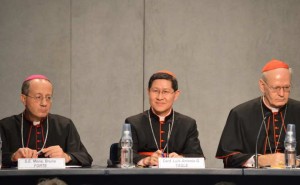
Synod Bishops © LifeSiteNews
The mealy-mouthed, politically correct betrayal of the Catholic Church occurring at the Synod of the Family in Rome is magisterially irrelevant.
There are two main audiences to this news. There are those living in what the Catechism of the Catholic Church defines as grave sin — fornication, homosexual relations, or adulterous unions with a person who is not their spouse (the politically correct term is “divorced and remarried Catholics”). Anyone who commits these sins with full knowledge and consent is guilty of mortal sin and will go to Hell unless they abandon their previous lifestyle and go to confession. Although the Synod may throw anesthetic on uneasy consciences, Catholics must continue to proclaim the truth to these people in charity.
But there is another way the Synod can give scandal. Faithful Catholics struggling to conform their lives to the teaching of Church are going to be tempted to question the indefectability of the Church. Jesus promised the Gates of Hell would never prevail against the Catholic Church.
How can a Church contradict its magisterial teaching on sexual ethics do so without the Gates of Hell prevailing against the Catholic Church?
The answer is simple. The contradiction against Catholic magisterium cannot take a magisterial form.
For example, the “Pastoral Care for Homosexual Persons,” released while Saint John Paul II was Pope and Pope Emeritus Benedict XVI was still Cardinal Ratzinger, the Prefect of the Congregation of the Doctrine of the Faith, is magisterial. It forbids Catholics from using reductionist terminology — “homosexual” when used as a noun (which conflates the homosexual inclination and the homosexual person), or adjectives such as “gay” (which conflates the sin of homosexual sex with the homosexual inclination). Similar magisterial documents condemn same-sex civil unions as something a Catholic cannot support in good conscience.
The document the Synod has released thus far directly defies the magisterial teaching in the Pastoral Care for Homosexual Persons by using the word homosexual as a noun. It is possible that Pope Francis will release a Post-Synodal Apostolic Exhortation will also make the same mistake or others (I certainly hope not, but it would not defy my expectations).
No Apostolic Exhortation coming out of this will not be part of the papal magisterium.
When Evangelii Gaudium came out, there was a great deal of controversy over the English translation using Leftist political terms like “trickle-down economics.”
Father Z suggested that the English translator had a political axe to grind and that the translation was unfaithful to the original Spanish draft. He advised that we wait for the definitive Latin edition of the document to come out.
So we waited. And we waited. And we waited.
No definitive Latin publication of Evangelii Gaudium was ever released.
According to the Constitution Veterum Sapientia promulgated by Saint John XXIII, Latin is the official language of the Catholic magisterium.
No Latin = No Magisterial document.
There is precedent for papal documents not to be written in Latin. Pope Saint John Paul II would often write pastoral documents after his famous visits. For example, he wrote a document about the Catholic Church in Europe and another document about the Church in Oceania. These documents never had any Latin edition because they were not magisterial. They were not universal in time or in geographic applicability. They were a snapshot message from Pope Saint John Paul II to the people of that place and time.
Cardinal Burke in an interview with EWTN (relevant section 20:00 minutes in) declared that he believed after reading Evangelii Gaudium that it was intended to be pastoral but non-magisterial. The lack of any Latin translation tipped the hand of the Church.
Cardinal Burke was right (as usual).
And so now we come to the Synod on the Family. On October 6, Pope Francis declared that Latin would not be the official language of the Synod.
Given precedent, we can assume no Latin edition will ever be published.
Now, the interesting question: Why?
Pope Francis is not interested in doctrine. He has emphasized that doctrine cannot change. But he seems willing to allow or encourage worldly German clerics to encourage more deference to sin by adopting the confusing terminology of modernity and allow people, in the words of Saint Paul “to eat and drink judgment on themselves.”
Denethor despaired of the West: “The West has failed! Go back and burn!”
We must not despair or join the Denethors of modernity who encourage disobedience as a result of the cowardice and sinfulness of members of the Catholic Church (read: SSPX).
Get thee to thy Bibles, be outspoken, shun despair, and do not lose heart. The magisterium is protected by the Holy Spirit and this Synod is magisterially irrelevant.
But when in Rome, do not do as the Synod Fathers do!


